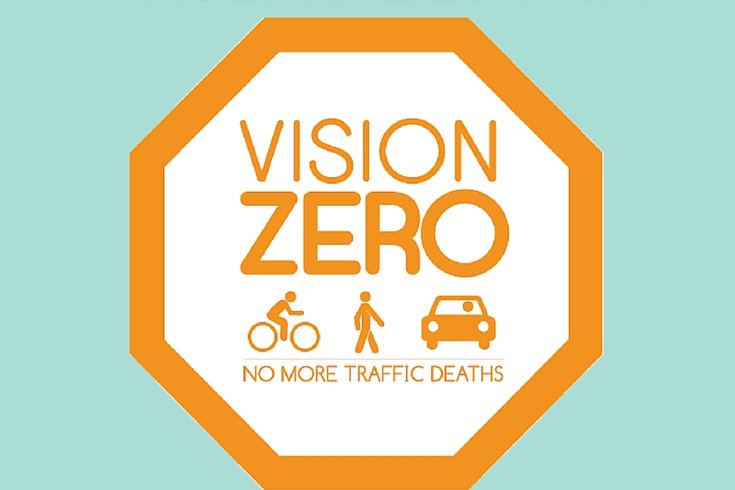
November 30, 2015
 Conference Logo/Courtesy of the Bicycle Coalition of Greater Philadelphia
Conference Logo/Courtesy of the Bicycle Coalition of Greater Philadelphia
A conference about the Vision Zero initiative will be held at Thomas Jefferson University Hospital on Thursday.
On Thursday, the Bicycle Coalition of Greater Philadelphia and Thomas Jefferson University Hospital will host a daylong conference focused on Vision Zero, an initiative “that seeks to reduce all traffic deaths to zero.”
The event is part of a push to get Philadelphia to embrace an initiative which – born in Sweden in the 1990s, it's already embraced by New York City, San Francisco, Seattle, Chicago and other U.S. cities – calls for a targeted program to address dangerous locations with the goal of reducing all traffic injuries and fatalities in Philadelphia, whether they be pedestrians, bicyclists or drivers.
“Vision Zero is based on the concept that road crashes are not accidents, but are preventable events,” the BCGP explains. “Through education, engineering and enforcement road deaths, currently totaling nearly 100 per year in Philadelphia, can be reduced to zero.”
Featured speakers include national experts in safety design, engineering, education and enforcement from both the public and private sectors. (Editor’s note: the writer of this article will speak at a breakout session titled “Human Cost of Crashes,” which focuses on “the scourge of hit-and-runs,” of which he was a victim in 2008.)
Sarah Clark Stuart, the BCGP’s acting executive director, said Jefferson’s interest in participating served as a jumping-off point.
“When Jefferson Hospital reached out to us back in February and indicated that they wanted to become involved in Vision Zero, we knew that they would be a critical new partner and could bring an important new sector, the medical community, to the table,” she said. “From our vantage point, we believe that there is a lot of work on engineering, education and enforcement already being conducted that needed to be more broadly known.
“We also believe that the lessons learned by agencies and advocates in other cities would be very useful to help those who will be working on Philadelphia's Vision Zero program in the near future.”
Politically speaking, Vision Zero was discussed during the mayoral primary and general campaigns. City Councilwoman Cindy Bass introduced a resolution focused on Vision Zero last year and will speak at the event, as well.
Mayor-elect Jim Kenney backed the idea to the point of saying he’d create a “Vision Zero Action Plan” task force and has a policy proposal surrounding it, which is being discussed by his Transportation and Infrastructure Transition Subcommittee.
The policy proposal states that Kenney will begin implementation of a Philadelphia plan shortly after his inauguration in January 2016.
“Philadelphia’s walkability and accessibility is a tremendous asset, and contributes to a high quality of life and makes the city a highly desirable place to live and work,” it reads. “But with this comes a responsibility to protect pedestrians and driver alike. To this end, multiple cities, and even countries have adopted the idea of Vision Zero, which holds that no crash or fatality is unavoidable.”
Kenney’s support has a lot to do with the timing, Stuart noted.
“In anticipation that he would want to start implementation early in his administration,” she said, “we at the Bicycle Coalition thought it would be useful to hold this conference to lay the groundwork by bringing the individuals in Philadelphia already working on various traffic safety programs and together with those who are working on Vision Zero programs in other cities to share information and learn from best practices."
Based on statistics from the Mayor's Office of Transportation and Utilities, the top 12 intersections for pedestrian-involved crashes are:
1. North Fifth Street and Olney Avenue
2. Broad and Race streets
3. Broad Street and Girard Avenue
4. Cottman Avenue and Roosevelt Boulevard
5. Broad Street and Olney Avenue
6. Broad Street and Lehigh Avenue
7. 40th and Market streets
8. 11th and Market streets
9. Chelten and Wayne avenues
10. 12th and Market streets
11. 63rd and Market streets
12. Cecil B. Moore Avenue and Broad Street
Thursday’s conference runs from 8:30 a.m. to 5:30 p.m. at Thomas Jefferson University Hospital’s Alumni Hall, 1020 Locust St. Registration for the event – which costs $60 to attend – is available via this link.